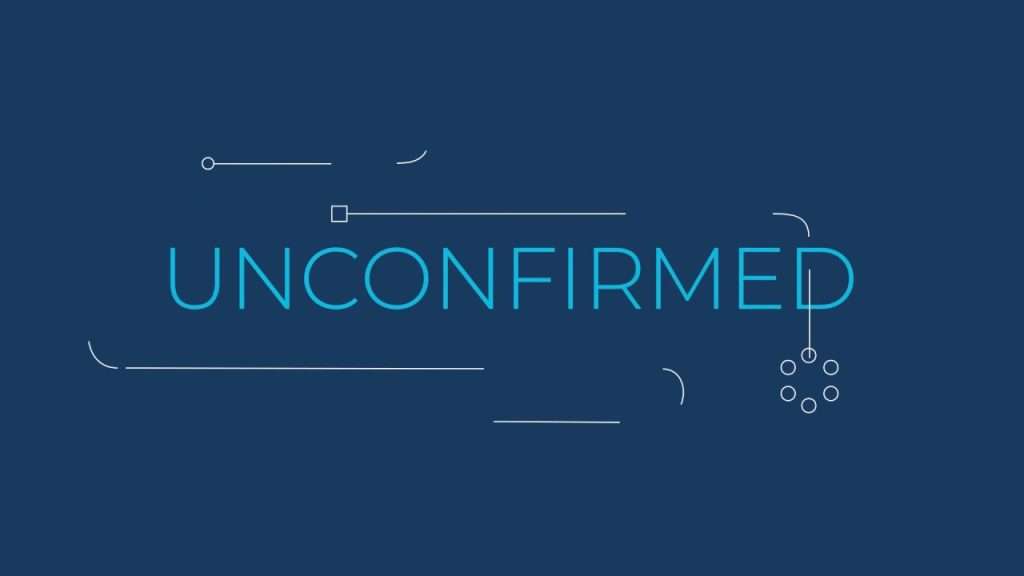TRANSACTIONS ON THE BLOCKCHAIN: The blockchain is a decentralized ledger system that enables secure and transparent transactions without the need for intermediaries like banks or governments. Transactions on the blockchain are verified and confirmed by miners who validate the transaction by adding it to a block. However, sometimes transactions can remain unconfirmed for a period of time, causing delays and frustration for users. In this article, we’ll explore what unconfirmed transactions are, why they occur, and how they can be resolved.
What are unconfirmed transactions?
Unconfirmed transactions refer to transactions on the blockchain that have not yet been verified by miners and added to the blockchain. When a user initiates a transaction, it is broadcasted to the network and awaits confirmation from miners. Once a miner confirms the transaction, it is added to a block and becomes part of the blockchain. Until that point, the transaction remains unconfirmed.
Why do unconfirmed transactions occur?
Unconfirmed transactions can occur for a variety of reasons. Here are some of the most common causes:
→ Network Congestion: When there are a large number of transactions on the blockchain, the network can become congested, and miners may take longer to confirm transactions.
→ Low Transaction Fees: Miners prioritize transactions with higher fees as they receive a percentage of the fees. Transactions with low fees may take longer to confirm or may not be confirmed at all.
→ Network Issues: Sometimes, network issues such as high latency or a loss of connectivity can cause delays in the confirmation of transactions.
→ Double Spending: Double spending occurs when a user tries to spend the same cryptocurrency twice. This is prevented by the blockchain’s consensus mechanism, but some users attempt to double-spend by broadcasting multiple transactions at the same time.
How can unconfirmed transactions be resolved?
If your transaction is unconfirmed, there are a few steps you can take to resolve the issue:
→ Wait: Sometimes, all that is needed is patience. In most cases, unconfirmed transactions are eventually confirmed, but it may take some time. The minimum wait time for a Bitcoin transaction to be successful is typically around 10 minutes. This is because each block on the Bitcoin blockchain is generated roughly every 10 minutes, and transactions need to be included in a block before they can be considered confirmed.
However, in some cases, particularly when the network is experiencing high traffic, transactions may take longer to confirm. It’s also worth noting that some Bitcoin wallets and exchanges may require additional confirmations (i.e., more blocks added to the blockchain) before they consider a transaction successful.
If you’re exchanging your crypto for fiat on web-based applications like DartAfrica, transactions occur at lightning speed (in under just 2 block confirmations). DartAfrica allows users to only deposit what they need to exchange for fiat at that time and users can instantly withdraw that into their local banks. Users are entirely in-charge of their accounts and have no fear of hidden charges or interference from third-party applications.
TRANSACTIONS ON THE BLOCKCHAIN

→ Increase the Transaction Fee: If you’re in a hurry to have your transaction confirmed, you can increase the transaction fee. This will incentivize miners to prioritize your transaction and include it in the next block. The transaction fee is a small amount of Bitcoin paid to miners for including the transaction in the next block they add to the blockchain.
Miners prefer transactions with higher fees because it means they will earn more Bitcoin for their work. Therefore, if a user increases their transaction fee, it makes their transaction more attractive to miners who will prioritize it over other transactions with lower fees. This can help the transaction get confirmed faster, especially during periods of high network congestion. It’s important to note that increasing the transaction fee does not guarantee that the transaction will be confirmed quickly.
→ Cancel the Transaction: If your transaction has not been confirmed for an extended period, you may be able to cancel it. However, this is only possible if the transaction is still unconfirmed and has not yet been added to a block.
→ Use a Transaction Accelerator: Some cryptocurrency wallets and exchanges offer transaction accelerators. These services can help to speed up the confirmation process by sending your transaction to a pool of miners who are actively mining blocks. Here are a few examples:
- Electrum: Electrum is a popular desktop wallet that offers a feature called “Replace-by-Fee” (RBF) that allows users to increase the fee on their transactions after they’ve been sent. This can help users speed up their transactions if they realize they’ve set the fee too low.
- Mycelium: Mycelium is a mobile wallet that also offers a transaction accelerator service. If a user’s transaction has been pending for a long time, they can use the “Rapid-Pay” feature to pay a higher fee and speed up the transaction.
- BitAccelerate: BitAccelerate is a web-based transaction accelerator service that can be used with any wallet. Users can enter their transaction ID and pay a fee to have their transaction prioritized and confirmed faster.
- ViaBTC: ViaBTC is a mining pool that also offers a transaction accelerator service. Users can submit their transaction ID and pay a fee to have their transaction included in the next block mined by the ViaBTC pool.
It’s important to note that using a transaction accelerator service may not guarantee that your transaction will be confirmed quickly, especially during times of high network congestion. It can still increase the chances of your transaction being included in the next block and therefore confirmed faster.
Unconfirmed transactions on the blockchain can be frustrating for users, but they are a common occurrence in the cryptocurrency world. They can be caused by network congestion, low transaction fees, network issues, or double-spending. However, there are steps you can take to resolve the issue, such as waiting, increasing the transaction fee, canceling the transaction, or using a transaction accelerator. By understanding the causes of unconfirmed transactions and the available solutions, you can minimize the impact of delays and continue to transact on the blockchain with confidence.



